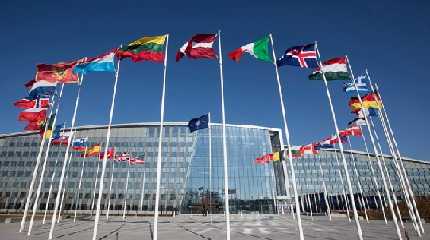
BRUSSELS, March 4 (Reuters) - NATO allies rejected Ukraine's demand for no-fly zones on Friday, saying they were increasing support but that stepping in directly would lead to a broader, even more brutal European war so far limited to Russia's assault on its neighbour.
Ukraine, a former Soviet republic, wants to join the European Union and Western military alliance NATO, whose members are bound in its founding treaty to defend each other from invasion.
"We are not part of this conflict," NATO Secretary-General Jens Stoltenberg told a news conference.
"We have a responsibility as NATO allies to prevent this war from escalating beyond Ukraine because that would be even more dangerous, more devastating and would cause even more human suffering."
Thousands of people are believed to have been killed or wounded and more than 1 million refugees have fled Ukraine since Feb. 24, when Russia's President Vladimir Putin ordered the biggest attack on a European state since World War Two.
Ukrainian President Volodymyr Zelenskiy has called for Western powers to enforce a no-fly zone, with Russia shelling cities and bringing fighting to Europe's largest nuclear plant.
Support for Ukraine so far has come mainly in the form of far-reaching sanctions on Russia, with EU members on Friday saying more financial punishment was yet to come. NATO members have sent weapons to Ukraine, but stopped short of military action.
In a video message earlier on Friday, Ukrainian Foreign Minister Dmytro Kuleba said NATO foreign ministers should not allow Putin to "turn Ukraine into Syria," in reference to the devastating Russia-backed campaign against rebel cities in that country.
"Act now before it's too late," he said in the message posted on Twitter.
Stoltenberg said NATO understood Ukraine's desperation, calling Russia's war in Ukraine "horrific" and warning the worst was yet to come, with Russia rolling out more heavy arms. But he said a no-fly zone could only be enforced by sending NATO planes to shoot down Russian ones, adding that the risk of escalation would be too big.
Russia and NATO-members United States, Britain and France are all nuclear powers.
"Allies agree we should not have NATO planes operating over Ukrainian airspace or NATO troops operating in Ukrainian territory," Stoltenberg said.
U.S. Secretary of State Antony Blinken said the alliance would defend "every inch" of NATO territory from attack. "Ours is a defensive alliance. We seek no conflict. But if conflict comes to us, we are ready," Blinken said.
Russian invasion forces seized Europe's biggest nuclear power plant on Friday in heavy fighting in southeastern Ukraine, triggering global alarm. A fire in a training building was extinguished and officials said the facility was now safe.
MORE EU SANCTIONS
Instead of a military presence in Ukraine, EU countries - most of them also NATO members - said they were eyeing more economic sanctions to add to coordinated restrictions that have already targeted Russia's financial system and elites.
"We will consider everything," the bloc's top diplomat Josep Borrell said, when asked about the possible suspension of the EU's gas imports from Russia, which think-tank Eurointelligence said amount to $700 million daily even during the war.
"This is Putin's war, and Putin has to stop this war," Borrell said.
It was not immediately clear, however, when the EU would agree on measures given some countries' heavy reliance on Russian energy supplies.
The 27-nation bloc is examining curbs on Russia's influence and access to finance at the International Monetary Fund following its invasion of Ukraine, six officials told Reuters.
Ireland's Foreign Minister Simon Coveney said no new sanctions would be announced on Friday but that a fourth round could affect more Russian banks' access to the SWIFT international transfer system, bar Russian ships from European ports and cut imports like steel, timber, aluminium or coal.
German Foreign Minister Annalena Baerbock said the bloc should close any loopholes that could allow Russia to circumvent sanctions.
Putin launched his "special military operation" to get rid of what he said was Ukraine's fascist government and demilitarize the country. Zelenskiy says Moscow is trying to prevent a liberal democracy flourishing on Russia's border.
"The picture looks very bleak and very dark in terms of Russia's intentions ... and so I think there is huge concern, and there is no point in sugar-coating it," Coveney said.




